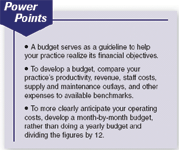Article
How to plug revenue leaks
Good financial planning and sharp shopping will help you boostincome and keep more of what you earn.
"Making a budget is a lot like going on a diet. Everyone agrees it's a good idea, but most people stick to it only for a short while," says Kathryn Moghadas, a consultant with Associated Healthcare Advisors in Casselberry, FL. "Also like good eating habits, budgets are more palatable if they're established early on."

Without a budget your practice is, essentially, flying blind. "Ultimately, the budget serves as a financial roadmap for the practice to achieve its goals," says Kenneth T. Hertz, a senior consultant with the Medical Group Management Association Healthcare Consulting Group in Alexandria, LA. "Only by going through the budgeting process can a practice know where it is in relation to its objectives and understand what it'll take to get back on track."
Get details on where the money's going
To develop a budget, review your practice's productivity, market, reimbursements, costs, and staffing needs, and compare these to available benchmarks.
First, look at your monthly financial statements for the last two years, says consultant Keith Borglum, of Professional Management and Marketing in Santa Rosa, CA. You want to understand as much as you can. How many patients did you see? How much revenue did you take in? What are your employees receiving in salary and benefits? What are you paying yourself? What are you paying for supplies and marketing? What are your telephone, insurance, rent, utility, and building maintenance costs? How about miscellaneous items, including CME, journals, postage, and laundry?
"Often," Borglum says, "medical practices bunch their expenses, so they don't know what they're spending on specific items." If, say, you suspect that your supply costs are too high, don't just list 'supplies' on your financial statement. List clinical supplies, clerical supplies, administrative supplies. If you have a lab, you might want to list those supplies separately. In doing so, you're more likely to figure out where you're overspending.





